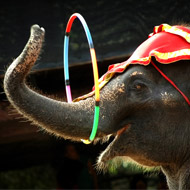The proposed bill would make it a criminal offence for a wild animal to be used in a travelling circus in Wales.
RSPCA welcomes move which could lead to an outright ban
A consultation on a draft law banning the use of wild animals in travelling circuses has been launched by the Welsh government.
The proposed bill follows years of campaigning by the RSPCA and would make it a criminal offence for a wild animal to be used in a travelling circus in Wales.
Rural affairs secretary Lesley Griffiths said: “We believe that wild animals should be treated with dignity and respect as sentient beings, and not objectified or perceived as commodities for our entertainment.
“A ban will send a clear message that the people of Wales believe this practice to be an outdated notion and ethically unacceptable.
“We want future generations of children and young people to develop respectful and responsible attitudes towards animals. I would urge everyone with an interest to give their views on our proposals and take part in the consultation."
RSPCA senior scientific manager Dr Ros Clubb welcomed the move, adding that the draft bill marks the next step in what could soon be an outright ban on the use of wild animals in circuses in Wales.
“RSPCA Cymru looks forward to closely scrutinising this bill, and working with the Welsh Government and Assembly Members to ensure this out-dated, harmful practice is consigned to the history books in Wales,” he said.
“The transient nature of circuses – alongside cramped accommodation and forced training for animals – highlights how inappropriate these settings are for wild animals. Indeed, the RSPCA has campaigned for decades for a ban - and we know the people of Wales support us, with 74 per cent backing an end to the use of wild animals in circuses.
“Some 9,000 people backed an RSPCA petition calling for a ban, and we will now work to ensure their concerns are heard and this legislative process ends with Wales joining the growing list of countries who have furthered animal welfare by bringing an end to this Victorian practice.”







 Birmingham Dogs Home has issued an urgent winter appeal as it faces more challenges over the Christmas period.
Birmingham Dogs Home has issued an urgent winter appeal as it faces more challenges over the Christmas period.
